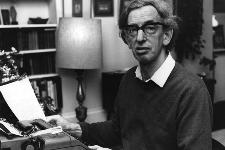 Following David’s post last week, I thought I’d remark on another historian who recently passed away: Eric Hobsbawm, who died last Monday. (NY Times obituary.) Hobsbawm, like Genovese, was a Marxist historian who wrote in the 1960s and 1970s, but unlike Genovese, he never altered his view. Hobsbawm is most widely known for his masterful history of the “long nineteenth century,” a term he coined to describe the period from 1789 to 1914 (which has a lot going for it as a sensible periodization).
Following David’s post last week, I thought I’d remark on another historian who recently passed away: Eric Hobsbawm, who died last Monday. (NY Times obituary.) Hobsbawm, like Genovese, was a Marxist historian who wrote in the 1960s and 1970s, but unlike Genovese, he never altered his view. Hobsbawm is most widely known for his masterful history of the “long nineteenth century,” a term he coined to describe the period from 1789 to 1914 (which has a lot going for it as a sensible periodization).
Hobsbawm was a formative influence on me, but not because of his three-volume masterwork on the Victorian era. In 1959, three years before “The Age of Revolution: 1789-1848,” Hobsbawm wrote a slim volume of essays that looked at bandits: Primitive Rebels: Studies in Archaic Forms of Social Movement in the 19th and 20th Centuries. The specific argument of the book was that bandits can in some circumstances be seen as proto-revolutionaries fighting against landed interests or capital. But the part that has stuck with me is a more general one: that actions outside of law, possibly even contrary to law, are part of a web of enforcement of the rules of a given society. Hobsbawm’s bandits were not simply rulebreakers; they were, in his telling, attempting to enforce different rules from the ones being imposed from the top down. And they had their own procedures — rituals — that they followed in doing so. Others picked up from where Hobsbawm began, demonstrating, for instance, that in many vigilante movements, the participants viewed themselves as upholding the law rather than violating it, going so far as to hold trials. This may not seem like such a stretch in the case of the fabled western Law and Order committee that cracks down on violent thugs (although such tales are generally more fable than reality); but it applies equally well to vigilante movements with no trace of modern justification, such as the Ku Klux Klan in the Reconstruction South. The Klan members also saw themselves as upholding the law — the law that gave whites preference at the polls and in land ownership.
Lawyers, law professors, and judges generally have a pretty cut-and-dried view of how the law operates: it regulates behavior, and it does so by providing rules for separating actions into legal and non-legal, or rights-violating or not. Those rules are then enforced in courts or administrative agencies, and that is how society is regulated. There is an assumption among lawyers, judges, and policymakers, I think, that all this happens costlessly, as if by magic; that no matter how detailed the legislation, or how many exceptions it contains, it becomes law just as easily as the simplest command. But the law as it actually operates in a society is seen through a glass darkly, and the more complex or counterintuitive the provision, the dimmer it will appear. Furthermore, laws serve a number of different purposes; regulation is only one. Another is serving as a signifier of changes in the status of various groups. Some of the most heated debates over law have this quality, where the combatants believe that not only is the law bad policy, but that it is an insult to them if it is adopted or retained.
My abiding interests in legal scholarship all have to do with situations where the content of the law and perceptions of it appear to be pulling apart for some reason. In some circumstances that may lead to violence, as in the case of the bandits Hobsbawm studied, but more often in modern society it leads simply to heated arguments — or, in recent years in the United States, to fears that if the opposing side wins, the welfare of the country will greatly suffer for it. I think what Hobsbawm’s early scholarship shows is that there is something more fundamental than mere political debate — or debates over intellectual property, or privacy, or criminal law — occurring right now.

Bruce, thank you for a very provocative post. It got me thinking about current shifts taking place in the realm of legal history. For several decades, sophisticated legal historians explored law’s relationship to other forces, trends, and developments. Legal historians did not take law to be self-contained or self-generating, but they did study law in relationship to history. We might call this “law in history” scholarship, and it parallels the “law and society” approach common in law-related social science work. More recently, though, some legal historians have started to insist that law is so thoroughly intertwined with history that it is surely difficult to say where one stops an the other begins. Instead of “law in history” scholarship, a call has been issued for “law as history” scholarship, one that, to use Kunal Parker’s phrase, sees law as a fundamental “species of politics.” Law does not exist in conjunction with history but rather is planted deeply in history. Hobsbawm, I think, would approve of this shift.